- Home
- Lloyd Alexander
The Foundling
The Foundling Read online
For Friends of Prydain,
who promised to read more
if I promised to write more
Table of Contents
Title Page
THE FOUNDLING
THE STONE
THE TRUE ENCHANTER
THE RASCAL CROW
THE SWORD
THE SMITH, THE WEAVER, AND THE HARPER
COLL AND HIS WHITE PIG
THE TRUTHFUL HARP
Author’s Note
The Chronicles of Prydain by Lloyd Alexander:
Prydain Pronunciation Guide
About the Author
Copyright Page
THE FOUNDLING
This is told of Dallben, greatest of enchanters in Prydain: how three black-robed hags found him, when he was still a baby, in a basket at the edge of the Marshes of Morva. “Oh, Orddu, see what’s here!” cried the one named Orwen, peering into the wicker vessel floating amid the tall grasses. “Poor lost duckling! He’ll catch his death of cold! Whatever shall we do with him?”
“A sweet morsel,” croaked the one named Orgoch from the depths of her hood. “A tender lamb. I know what I should do.”
“Please be silent, Orgoch,” said the one named Orddu. “You’ve already had your breakfast.” Orddu was a short, plump woman with a round, lumpy face and sharp black eyes. Jewels, pins, and brooches glittered in her tangle of weedy hair. “We can’t leave him here to get all soggy. I suppose we shall have to take him home with us.”
“Oh, yes!” exclaimed Orwen, dangling her string of milky white beads over the tiny figure in the basket. “Ah, the darling tadpole! Look at his pink cheeks and chubby little fingers! He’s smiling at us, Orddu! He’s waving! But what shall we call him? He mustn’t go bare and nameless.”
“If you ask me—” began Orgoch.
“No one did,” replied Orddu. “You are quite right, Orwen. We must give him a name. Otherwise, how shall we know who he is?”
“We have so many names lying around the cottage,” said Orwen. “Some of them never used. Give him a nice, fresh, unwrinkled one.”
“There’s a charming name I’d been saving for a special occasion,” Orddu said, “but I can’t remember what I did with it. No matter. His name—his name: Dallben.”
“Lovely!” cried Orwen, clapping her hands. “Oh, Orddu, you have such good taste.”
“Taste, indeed!” snorted Orgoch. “Dallben? Why call him Dallben?”
“Why not?” returned Orddu. “It will do splendidly. Very good quality, very durable. It should last him a lifetime.”
“It will last him,” Orgoch muttered, “as long as he needs it.”
And so Dallben was named and nursed by these three, and given a home in their cottage near the Marshes of Morva. Under their care he grew sturdy, bright, and fair of face. He was kind and generous, and each day handsomer and happier.
The hags did not keep from him that he was a foundling. But when he was of an age to wonder about such matters, he asked where indeed he had come from, and what the rest of the world was like.
“My dear chicken,” replied Orddu, “as to where you came from, we haven’t the slightest notion. Nor, might I say, the least interest. You’re here with us now, to our delight, and that’s quite enough to know.”
“As to the rest of the world,” Orwen added, “don’t bother your pretty, curly head about it. You can be sure it doesn’t bother about you. Be glad you were found instead of drowned. Why, this very moment you might be part of a school of fish. And what a slippery, scaly sort of life that would be!”
“I like fish,” muttered Orgoch, “especially eels.”
“Do hush, dear Orgoch,” said Orddu. “You’re always thinking of your stomach.”
Despite his curiosity, Dallben saw there was no use in questioning further. Cheerful and willing, he went about every task with eagerness and good grace. He drew pails of water from the well, kept the fire burning in the hearth, pumped the bellows, swept away the ashes, and dug the garden. No toil was too troublesome for him. When Orddu spun thread, he turned the spinning wheel. He helped Orwen measure the skeins into lengths and held them for Orgoch to snip with a pair of rusty shears.
One day, when the three brewed a potion of roots and herbs, Dallben was left alone to stir the huge, steaming kettle with a long iron spoon. He obeyed the hags’ warning not to taste the liquid, but soon the potion began boiling so briskly that a few drops bubbled up and by accident splashed his fingers. With a cry of pain, Dallben let fall the spoon and popped his fingers into his mouth.
His outcry brought Orddu, Orwen, and Orgoch hurrying back to the cottage.
“Oh, the poor sparrow!” gasped Orwen, seeing the boy sucking at his blistered knuckles. “He’s gone and burned himself. I’ll fetch an ointment for the sweet fledgling, and some spiderwebs to bandage him. What did you do with all those spiders, Orgoch? They were here only yesterday.”
“Too late for all that,” growled Orgoch. “Worse damage is done.”
“Yes, I’m afraid so,” Orddu sighed. “There’s no learning without pain. The dear gosling has had his pain; and now, I daresay, he has some learning to go along with it.”
Dallben, meanwhile, had swallowed the drops of liquid scalding his fingers. He licked his lips at the taste, sweet and bitter at the same time. And in that instant he began to shake with fear and excitement. All that had been common and familiar in the cottage he saw as he had never seen before.
Now he understood that the leather bellows lying by the hearth commanded the four winds; the pail of water in the corner, the seas and oceans of the world. The earthen floor of the cottage held the roots of all plants and trees. The fire showed him the secrets of its flame, and how all things come to ashes. He gazed awe-struck at the enchantresses, for such they were.
“The threads you spin, and measure, and cut off,” Dallben murmured, “these are no threads, but the lives of men. I know who you truly are.”
“Oh, I doubt it,” Orddu cheerfully answered. “Even we aren’t always sure of that. Nevertheless, one taste of that magical brew and you know as much as we do. Almost as much, at any rate.”
“Too much for his own good,” muttered Orgoch.
“But what shall we do?” moaned Orwen. “He was such a sweet, innocent little robin. If only he hadn’t swallowed the potion! Is there no way to make him unswallow it?”
“We could try,” said Orgoch.
“No,” declared Orddu. “What’s done is done. You know that as well as I. Alas, the dear duckling will have to leave us. There’s nothing else for it. So many people, knowing so much, under the same roof? All that knowledge crammed in, crowded, bumping and jostling back and forth? We’d not have room to breathe!”
“I say he should be kept,” growled Orgoch.
“I don’t think he’d like your way of keeping him,” Orddu answered. She turned to Dallben. “No, my poor chicken, we must say farewell. You asked us once about the world? I’m afraid you’ll have to see it for yourself.”
“But, Orddu,” protested Orwen, “we can’t let him march off just like that. Surely we have some little trinket he’d enjoy? A goingaway present, so he won’t forget us?”
“I could give him something to remember us by,” began Orgoch.
“No doubt,” said Orddu. “But that’s not what Orwen had in mind. Of course, we shall offer him a gift. Better yet, he shall choose one for himself.”
As Dallben watched, the enchantress unlocked an iron-bound chest and rummaged inside, flinging out all sorts of oddments until there was a large heap on the floor.
“Here’s something,” Orddu at last exclaimed. “Just the thing for a bold young chicken. A sword!”
Dallben caught his breath in wonder as Orddu put the weapon i
n his hands. The hilt, studded with jewels, glittered so brightly that he was dazzled and nearly blinded. The blade flashed, and a thread of fire ran along its edges.
“Take this, my duckling,” Orddu said, “and you shall be the greatest warrior in Prydain. Strength and power, dear gosling! When you command, all must obey even your slightest whim.”
“It is a fine blade,” Dallben replied, “and comes easily to my hand.”
“It shall be yours,” Orddu said. “At least, as long as you’re able to keep it. Oh, yes,” the enchantress went on, “I should mention it’s already had a number of owners. Somehow, sooner or later, it wanders back to us. The difficulty, you see, isn’t so much getting power as holding on to it. Because so many others want it, too. You’d be astonished, the lengths to which some will go. Be warned, the sword can be lost or stolen. Or bent out of shape—as, indeed, so can you, in a manner of speaking.”
“And remember,” put in Orwen, “you must never let it out of your sight, not for an instant.”
Dallben hesitated a moment, then shook his head. “I think your gift is more burden than blessing.”
“In that case,” Orddu said, “perhaps this will suit you better.”
As Dallben laid down the sword, the enchantress handed him a golden harp, so perfectly wrought that he no sooner held it than it seemed to play of itself.
“Take this, my sparrow,” said Orddu, “and be the greatest bard in Prydain, known throughout the land for the beauty of your songs.”
Dallben’s heart leaped as the instrument thrilled in his arms. He touched the sweeping curve of the glowing harp and ran his fingers over the golden strings. “I have never heard such music,” he murmured. “Who owns this will surely have no lack of fame.”
“You’ll have fame and admiration a-plenty,” said Orddu, “as long as anyone remembers you.”
“Alas, that’s true,” Orwen said with a sigh. “Memory can be so skimpy. It doesn’t stretch very far; and, next thing you know, there’s your fame gone all crumbly and mildewed.”
Sadly, Dallben set down the harp. “Beautiful it is,” he said, “but in the end, I fear, little help to me.”
“There’s nothing else we can offer at the moment,” said Orddu, delving once more into the chest, “unless you’d care to have this book.”
The enchantress held up a large, heavy tome and blew away the dust and cobwebs from its moldering leather binding. “It’s a bulky thing for a young lamb to carry. Naturally, it would be rather weighty, for it holds everything that was ever known, is known, and will be known.”
“It’s full of wisdom, thick as oatmeal,” added Orwen. “Quite scarce in the world—wisdom, not oatmeal—but that only makes it the more valuable.”
“We have so many requests for other items,” Orddu said. “Seven-league boots, cloaks of invisibility, and such great nonsense. For wisdom, practically none. Yet whoever owns this book shall have all that and more, if he likes. For the odd thing about wisdom is the more you use it the more it grows; and the more you share, the more you gain. You’d be amazed how few understand that. If they did, I suppose, they wouldn’t need the book in the first place.”
“Do you give this to me?” Dallben asked. “A treasure greater than all treasures?”
Orddu hesitated. “Give? Only in a manner of speaking. If you know us as well as you say you do, then you also know we don’t exactly give anything. Put it this way: We shall let you take that heavy, dusty old book if that’s what you truly want. Again, be warned: The greater the treasure, the greater the cost. Nothing is given for nothing; not in the Marshes of Morva—or anyplace else, for the matter of that.”
“Even so,” Dallben replied, “this book is my choice.”
“Very well,” said Orddu, putting the ancient volume in his hands. “Now you shall be on your way. We’re sorry to see you go, though sorrow is something we don’t usually feel. Fare well, dear chicken. We mean this in the polite sense, for whether you fare well or ill is entirely up to you.”
So Dallben took his leave of the enchantresses and set off eagerly, curious to see what lay in store not only in the world but between the covers of the book. Once the cottage was well out of sight and the marshes far behind him, he curbed his impatience no longer, but sat down by the roadside, opened the heavy tome, and began to read.
As he scanned the first pages, his eyes widened and his heart quickened. For here was knowledge he had never dreamed of: the pathways of the stars, the rounds of the planets, the ebb and flow of time and tide. All secrets of the world and all its hidden lore unfolded to him.
Dallben’s head spun, giddy with delight. The huge book seemed to weigh less than a feather, and he felt so lighthearted he could have skipped from one mountaintop to the next and never touched the ground. He laughed and sang at the top of his voice, bursting with gladness, pride, and strength in what he had learned.
“I chose well!” he cried, jumping to his feet. “But why should Orddu have warned me? Cost? What cost can there be? Knowledge is joy!”
He strode on, reading as he went. Each page lightened and sped his journey, and soon he came to a village where the dwellers danced and sang and made holiday. They offered him meat and drink and shelter for the coming night.
But Dallben thanked them for their hospitality and shook his head, saying he had meat and drink enough in the book he carried. By this time he had walked many miles, but his spirit was fresh and his legs unweary.
He kept on his way, hardly able to contain his happiness as he read and resolving not to rest until he had come to the end of the book. But he had finished less than half when the pages, to his horror, began to grow dark and stained with blood and tears.
For now the book told him of other ways of the world; of cruelty, suffering, and death. He read of greed, hatred, and war; of men striving against one another with fire and sword; of the blossoming earth trampled underfoot, of harvests lost and lives cut short. And the book told that even in the same village he had passed, a day would come when no house would stand; when women would weep for their men, and children for their parents; and where they had offered him meat and drink, they would starve for lack of a crust of bread.
Each page he read pierced his heart. The book, which had seemed to weigh so little, now grew so heavy that his pace faltered and he staggered under the burden. Tears blinded his eyes, and he stumbled to the ground.
All night he lay shattered by despair. At dawn he stirred and found it took all his efforts even to lift his head. Bones aching, throat parched, he crept on hands and knees to quench his thirst from a puddle of water. There, at the sight of his reflection, he drew back and cried out in anguish.
His fair, bright curls had gone frost-white and fell below his brittle shoulders. His cheeks, once full and flushed with youth, were now hollow and wrinkled, half hidden by a long, gray beard. His brow, smooth yesterday, was scarred and furrowed, his hands gnarled and knotted, his eyes pale as if their color had been wept away.
Dallben bowed his head. “Yes, Orddu,” he whispered, “I should have heeded you. Nothing is given without cost. But is the cost of wisdom so high? I thought knowledge was joy. Instead, it is grief beyond bearing.”
The book lay nearby. Its last pages were still unread and, for a moment, Dallben thought to tear them to shreds and scatter them to the wind. Then he said:
“I have begun it, and I will finish it, whatever else it may foretell.”
Fearfully and reluctantly, he began to read once more. But now his heart lifted. These pages told not only of death, but of birth as well; how the earth turns in its own time and in its own way gives back what is given to it; how things lost may be found again; and how one day ends for another to begin. He learned that the lives of men are short and filled with pain, yet each one a priceless treasure, whether it be that of a prince or a pig-keeper. And, at the last, the book taught him that while nothing was certain, all was possible.
“At the end of knowledge, wisdom begins,” Dall
ben murmured. “And at the end of wisdom there is not grief, but hope.”
He climbed to his withered legs and hobbled along his way, clasping the heavy book. After a time a farmer drove by in a horse-drawn cart, and called out to him:
“Come, Grandfather, ride with me if you like. That book must be a terrible load for an old man like you.”
“Thank you just the same,” Dallben answered, “but I have strength enough now to go to the end of my road.”
“And where might that be?”
“I do not know,” Dallben said. “I go seeking it.”
“Well, then,” said the farmer, “may you be lucky enough to find it.”
“Luck?” Dallben answered. He smiled and shook his head. “Not luck, but hope. Indeed, hope.”
THE STONE
There was a cottager named Maibon, and one day he was driving down the road in his horse and cart when he saw an old man hobbling along, so frail and feeble he doubted the poor soul could go many more steps. Though Maibon offered to take him in the cart, the old man refused; and Maibon went his way home, shaking his head over such a pitiful sight, and said to his wife, Modrona:
“Ah, ah, what a sorry thing it is to have your bones creaking and cracking, and dim eyes, and dull wits. When I think this might come to me, too! A fine, strong-armed, sturdy-legged fellow like me? One day to go tottering, and have his teeth rattling in his head, and live on porridge, like a baby? There’s no fate worse in all the world.”
“There is,” answered Modrona, “and that would be to have neither teeth nor porridge. Get on with you, Maibon, and stop borrowing trouble. Hoe your field or you’ll have no crop to harvest, and no food for you, nor me, nor the little ones.”
Sighing and grumbling, Maibon did as his wife bade him. Although the day was fair and cloudless, he took no pleasure in it. His axe-blade was notched, the wooden handle splintery; his saw had lost its edge; and his hoe, once shining new, had begun to rust. None of his tools, it seemed to him, cut or chopped or delved as well as they once had done.

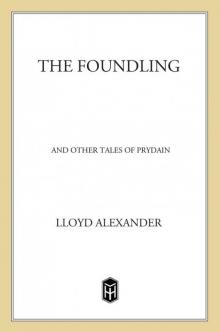 The Foundling and Other Tales of Prydain
The Foundling and Other Tales of Prydain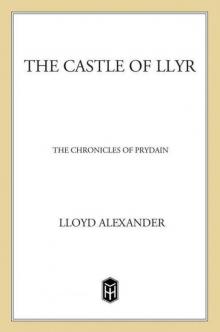 The Castle of Llyr
The Castle of Llyr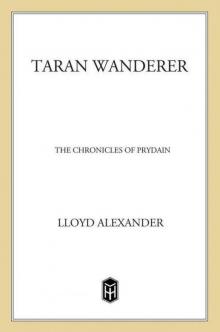 Taran Wanderer (The Chronicles of Prydain)
Taran Wanderer (The Chronicles of Prydain)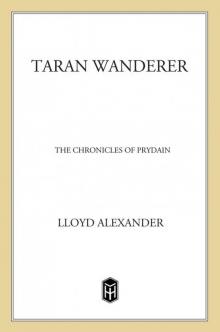 Taran Wanderer
Taran Wanderer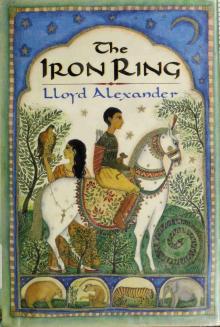 The Iron Ring
The Iron Ring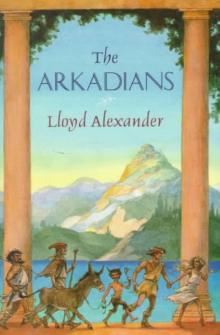 The Arkadians
The Arkadians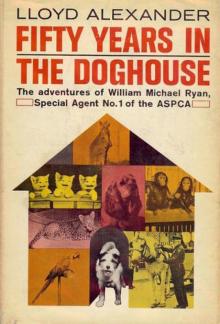 Fifty Years in the Doghouse
Fifty Years in the Doghouse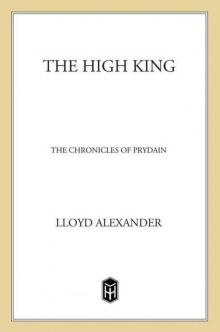 The High King
The High King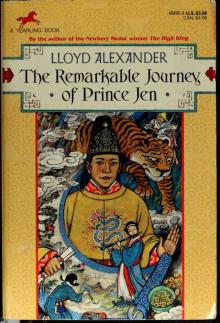 The Remarkable Journey of Prince Jen
The Remarkable Journey of Prince Jen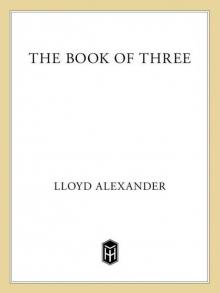 The Book of Three
The Book of Three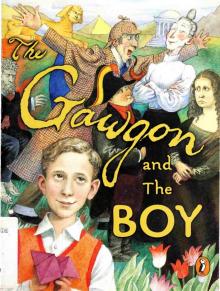 The Gawgon and the Boy
The Gawgon and the Boy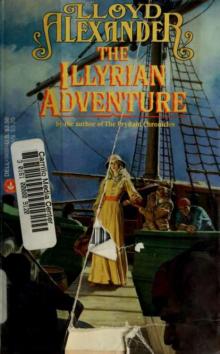 The Illyrian Adventure
The Illyrian Adventure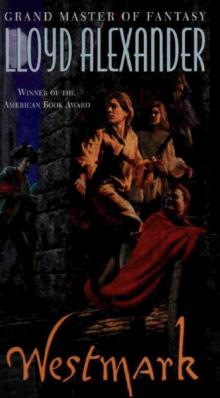 Westmark
Westmark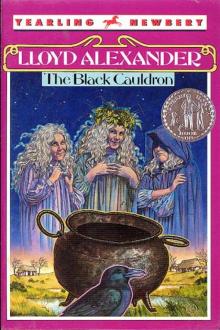 The Black Cauldron
The Black Cauldron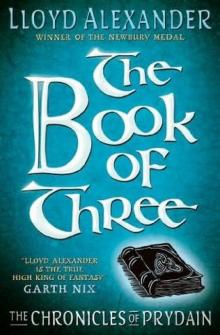 The Book of Three cop-1
The Book of Three cop-1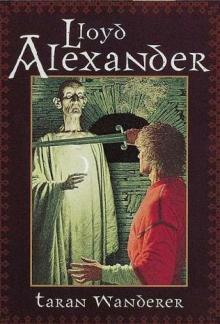 Taran Wanderer cop-4
Taran Wanderer cop-4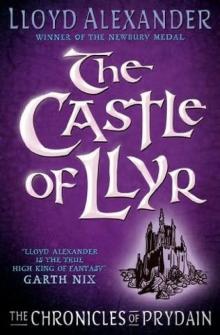 The Castle of Llyr cop-3
The Castle of Llyr cop-3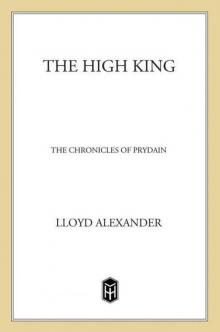 The High King (Chronicles of Prydain (Henry Holt and Company))
The High King (Chronicles of Prydain (Henry Holt and Company))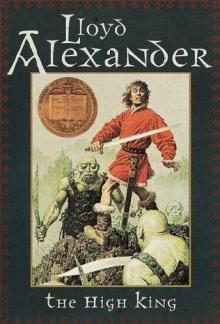 The High King cop-5
The High King cop-5 The Foundling
The Foundling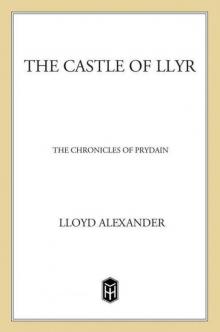 The Castle of Llyr (The Chronicles of Prydain)
The Castle of Llyr (The Chronicles of Prydain)